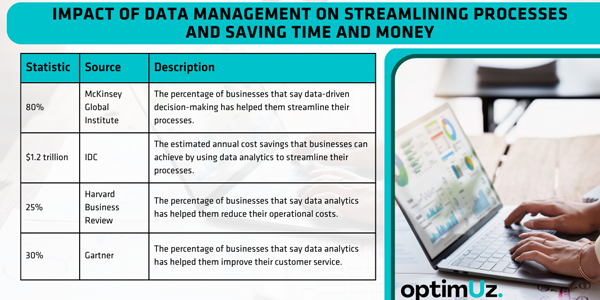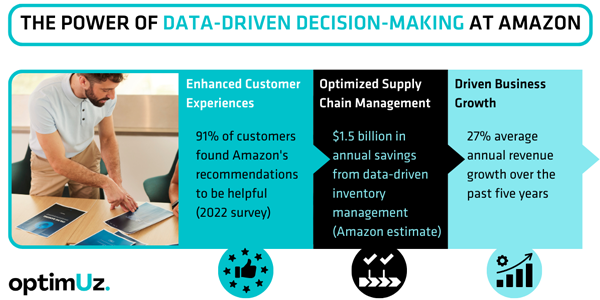The Importance of Data Management for Businesses: Making Informed Decisions & Streamlining Processes

In today’s digital age, effective data management is vital for businesses to make informed decisions, comply with regulations, improve customer service, and streamline processes. This article delves into the significance of data management and its numerous benefits, while showcasing a real case study on Amazon’s successful implementation of data management practices.
Making Informed Decisions
with Accurate Data
Data management provides businesses with the foundation to make informed decisions. By establishing clear guidelines for data collection, storage, and usage, companies ensure access to accurate and up-to-date information.
This enables data-driven decision-making, empowering businesses to analyze market trends, customer behavior, and operational performance. By leveraging reliable data, businesses can confidently make strategic decisions that drive growth and success.
Compliance with Data Privacy
and Security Regulations
Effective data management practices enable businesses to comply with regulations and standards for data privacy and security. By implementing secure systems for data storage and access, companies protect sensitive information and build trust with their customers.
Amazon, for instance, employs robust data management practices to safeguard customer data, ensuring compliance with regulations such as GDPR and reinforcing its commitment to data privacy.
Enhancing Customer Service
and Experience
Data management plays a pivotal role in improving customer service and enhancing the overall customer experience. Through accurate customer data, businesses can personalize interactions, anticipate needs, and provide tailored offerings.
Amazon excels in this aspect, leveraging comprehensive customer profiles to deliver personalized recommendations, targeted marketing campaigns, and a seamless user experience. By leveraging data insights, businesses can deliver exceptional customer experiences, foster loyalty, and drive customer satisfaction.
“The best customer service is when the customer doesn’t even know they’re being served.”
Walt Disney, the founder of The Walt Disney Company.
Streamlining Processes and
Saving Time and Money
Efficient data management streamlines business processes and reduces errors, resulting in significant time and cost savings. By establishing data collection systems and protocols, businesses automate data gathering and analysis, eliminating manual and error-prone processes.
Amazon’s effective data management enables streamlined supply chain management, inventory optimization, and operational efficiency, leading to reduced costs and improved performance. Streamlining processes through data management allows businesses to allocate resources effectively and focus on strategic initiatives.


Case Study: Amazon and Data-Driven Decision-Making
A prime example of successful data management implementation is Amazon, the global e-commerce giant. Amazon leverages data management to enhance customer experiences, optimize supply chain management, and drive business growth. They collect extensive customer data, analyze purchasing behavior, and create personalized customer profiles for tailored recommendations.
Amazon’s data-driven approach allows them to optimize supply chain operations, streamline logistics, and dynamically adjust pricing strategies based on real-time data insights. Through effective data management, Amazon continuously improves operations, introduces innovations, and stays ahead in the competitive e-commerce landscape.
Data management is a critical aspect of modern business operations. From making informed decisions to streamlining processes, effective data management offers businesses significant advantages. The success of Amazon serves as a real case study on how data management drives exceptional customer experiences, operational efficiency, and business growth. By embracing data management as a strategic imperative, businesses can optimize their operations, deliver personalized experiences, and achieve sustainable growth in today’s data-driven landscape.